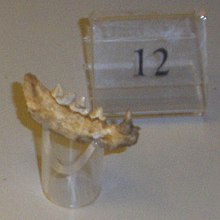Felis lunensis: Difference between revisions
m Open access bot: doi added to citation with #oabot. |
No edit summary |
||
| Line 7: | Line 7: | ||
| species = lunensis |
| species = lunensis |
||
| extinct = yes |
| extinct = yes |
||
| authority = [[ |
| authority = [[Alessandro Martelli|Martelli]], 1906 |
||
| synonyms = ''Felis silvestris lunensis''<br>Martelli's cat |
| synonyms = ''Felis silvestris lunensis''<br>Martelli's cat |
||
}} |
}} |
||
| Line 15: | Line 15: | ||
Around 12 million years ago, the genus ''[[Felis]]'' appeared and eventually gave rise to many of the modern small cats. ''Felis lunensis'' was one of the first modern ''Felis'' species, appearing around 2.5 million years ago in the [[Pliocene]]. Fossil specimens of ''F. lunensis'' have been recovered in [[Italy]] and [[Hungary]].<ref name="TPBDB"/> Fossil evidence suggests the modern European wildcat ''[[Felis silvestris]]'' may have evolved from ''F. lunensis'' during the Middle Pleistocene.<ref name="Yama2004">{{cite journal |last1=Yamaguchi |first1=N. |last2=Driscoll |first2=C.A. |last3=Kitchener |first3=A.C. |last4=Ward |first4=J.M. |last5=Macdonald |first5=D.W. |year=2004 |title=Craniological differentiation between European wildcats (''Felis silvestris silvestris''), African wildcats (''F. s. lybica'') and Asian wildcats (''F. s. ornata''): Implications for their evolution and conservation |journal=Biological Journal of the Linnean Society |volume=83 |pages=47–63 |url=http://www.filogenetica.org/cursos/deluna/morfometria/casos%20de%20estudio/catSkulls.pdf |doi=10.1111/j.1095-8312.2004.00372.x|doi-access=free }}</ref> This has resulted in ''F. lunensis'' occasionally being considered a subspecies of ''Felis silvestris''. |
Around 12 million years ago, the genus ''[[Felis]]'' appeared and eventually gave rise to many of the modern small cats. ''Felis lunensis'' was one of the first modern ''Felis'' species, appearing around 2.5 million years ago in the [[Pliocene]]. Fossil specimens of ''F. lunensis'' have been recovered in [[Italy]] and [[Hungary]].<ref name="TPBDB"/> Fossil evidence suggests the modern European wildcat ''[[Felis silvestris]]'' may have evolved from ''F. lunensis'' during the Middle Pleistocene.<ref name="Yama2004">{{cite journal |last1=Yamaguchi |first1=N. |last2=Driscoll |first2=C.A. |last3=Kitchener |first3=A.C. |last4=Ward |first4=J.M. |last5=Macdonald |first5=D.W. |year=2004 |title=Craniological differentiation between European wildcats (''Felis silvestris silvestris''), African wildcats (''F. s. lybica'') and Asian wildcats (''F. s. ornata''): Implications for their evolution and conservation |journal=Biological Journal of the Linnean Society |volume=83 |pages=47–63 |url=http://www.filogenetica.org/cursos/deluna/morfometria/casos%20de%20estudio/catSkulls.pdf |doi=10.1111/j.1095-8312.2004.00372.x|doi-access=free }}</ref> This has resulted in ''F. lunensis'' occasionally being considered a subspecies of ''Felis silvestris''. |
||
''Felis lunensis'' first [[Scientific description|described]] by [[ |
''Felis lunensis'' first [[Scientific description|described]] by [[Alessandro Martelli]] in 1906 was a [[mandible]] [[Excavation (archaeology)|excavated]] in Pliocene deposits near Olivola in [[Tuscany]].<ref>{{cite journal |last1=Martelli |first1=A. |year=1906 |title=Su due Mustelidi e un Felide del Pliocene Toscano |trans-title=About two Mustelids and one Felid of Pliocene Toscana |journal=Bollettino della Società Geologica Italiana |volume=25 |pages=595–612 |url=https://archive.org/details/bollettinodellas2519soci/page/606}}</ref> The [[holotype]] specimen is now preserved in the collection of the [[University of Florence]] in Italy.<ref name="Cioppi1983">{{cite journal |last1=Cioppi |first1=E. |last2=Mazzini |first2=M. |year=1983 |series=Catalogue of type specimens in the vertebrate collections of the museum of geology and paleontology of the University of Florence (Italy) |title=Part II: Carnivora, Felidae |journal=Atti della Societa Toscana di Scienze Naturali Residente in Pisa |volume=90 |pages=227–236 |url=http://cat.inist.fr/?aModele=afficheN&cpsidt=9188603}}</ref> |
||
==References== |
==References== |
||
Revision as of 16:33, 28 November 2021
| Felis lunensis | |
|---|---|

| |
| Fragment of f. lunensis fossilized jawbone, at Museo di Paleontologia di Firenze | |
| Scientific classification | |
| Domain: | Eukaryota |
| Kingdom: | Animalia |
| Phylum: | Chordata |
| Class: | Mammalia |
| Order: | Carnivora |
| Suborder: | Feliformia |
| Family: | Felidae |
| Subfamily: | Felinae |
| Genus: | Felis |
| Species: | †F. lunensis
|
| Binomial name | |
| †Felis lunensis Martelli, 1906
| |
| Synonyms | |
|
Felis silvestris lunensis | |
Felis lunensis (Martelli's cat) is an extinct felid of the subfamily Felinae.
Evolution and taxonomy
Around 12 million years ago, the genus Felis appeared and eventually gave rise to many of the modern small cats. Felis lunensis was one of the first modern Felis species, appearing around 2.5 million years ago in the Pliocene. Fossil specimens of F. lunensis have been recovered in Italy and Hungary.[1] Fossil evidence suggests the modern European wildcat Felis silvestris may have evolved from F. lunensis during the Middle Pleistocene.[2] This has resulted in F. lunensis occasionally being considered a subspecies of Felis silvestris.
Felis lunensis first described by Alessandro Martelli in 1906 was a mandible excavated in Pliocene deposits near Olivola in Tuscany.[3] The holotype specimen is now preserved in the collection of the University of Florence in Italy.[4]
References
- ^ a b "Felis lunensis". The Paleobiology Database. Retrieved 14 March 2010.
- ^ Yamaguchi, N.; Driscoll, C.A.; Kitchener, A.C.; Ward, J.M.; Macdonald, D.W. (2004). "Craniological differentiation between European wildcats (Felis silvestris silvestris), African wildcats (F. s. lybica) and Asian wildcats (F. s. ornata): Implications for their evolution and conservation" (PDF). Biological Journal of the Linnean Society. 83: 47–63. doi:10.1111/j.1095-8312.2004.00372.x.
- ^ Martelli, A. (1906). "Su due Mustelidi e un Felide del Pliocene Toscano" [About two Mustelids and one Felid of Pliocene Toscana]. Bollettino della Società Geologica Italiana. 25: 595–612.
- ^ Cioppi, E.; Mazzini, M. (1983). "Part II: Carnivora, Felidae". Atti della Societa Toscana di Scienze Naturali Residente in Pisa. Catalogue of type specimens in the vertebrate collections of the museum of geology and paleontology of the University of Florence (Italy). 90: 227–236.
